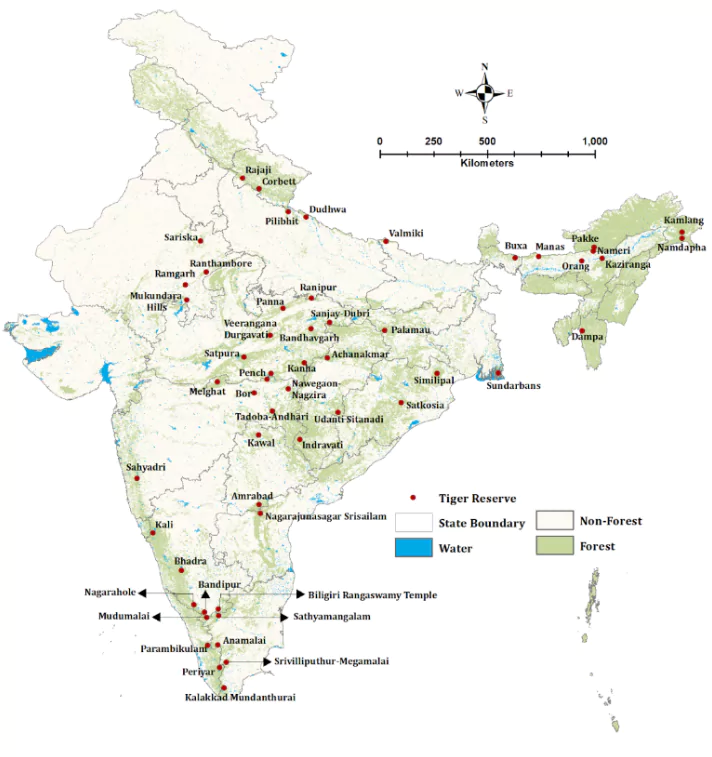The National Tiger Conservation Authority (NTCA) in a recent letter has asked 19 States to prioritise the removal of villagers residing in the core tiger zones.

- NTCA letter has asked the States to expedite the relocation of families from the Core Areas of Tiger Reserve so as to expand the Tiger Conservation Efforts
Relocation Powers of NTCA
- Volatary: The process of relocation is a voluntary act and NTCA cannot force the relocation of Tribal Communities without settling the rights of forest dwellers first.
- As per The Wildlife Act 1972, core zones are considered as ‘inviolate’ zones, but these must be realised by persuading the residents to “voluntarily relocate” on “mutually agreed terms and conditions”.
Impact of Forced Relocation
- Enforcement Bias and Harassment: NTCA’s directives will put pressure on the State governments to relocate communities resulting in illegal evictions fomenting conflicts between state authorities and the scheduled tribes (STs) and other traditional forest dwellers (OTFDS) living within the tiger reserves.
- In Violation of Forest Act: NTCA’s relocation orders acts in complete violation of the Wildlife (Protection) Act, the Forest Rights Act, the Right to Fair Compensation and Transparency in Land Acquisition, Rehabilitation and Resettlement Act (LARR), and the Scheduled Castes and Scheduled Tribes (Prevention of Atrocities) Act.
- Marginalization: NTCA’s action will lead to further marginalization of these communities by increasing their vulnerabilities such as economic and social insecurities, destitution and disruption of their eco-cultural fabric.
- Sustenance and Sustainablity: The Relocation action will negatively impact both the sustenance of tribal communities as well towards conservation efforts towards biodiversity and wildlife sustainability.
- The displacement of tribal communities from their ancestral lands can disrupt their traditional livelihoods, cultural practices, and community cohesion, leading to adverse social and economic consequences.
Enroll now for UPSC Online Classes
National Tiger Conservation Authority
- It is a statutory body set up under the section 38 L (1) of Wildlife (Protection) Act, 1972. (amended in 2006) for strengthening tiger conservation.
- Members: The Minister in charge of the Ministry of Environment and Forests is the Chairperson, alongside the Minister of State in MoEFCCC (as Vice-Chairperson), three members of Parliament, Secretary (MoEFCCC)and other members.
- Objectives:
- Giving legal authority to Project Tiger to make sure that following its guidelines becomes a legal requirement.
- Focus areas: On the ground protection initiatives to science based monitoring of tigers and their habitat, independent assesssement of tiger reserves with MEE framework, financial and technical support to tiger reserves.
- Power & Functions:
- To approve the tiger conservation plan prepared by the State Government.
- Sustain ecology: To evaluate and assess and permit any ecologically unsustainable land use such as, mining, industry and other projects within the tiger reserves
- To address conflicts of men and wild animal and to sanctuaries or tiger reserve, in the working plan code
Tiger Reserves
- The tiger reserves in India were set up as a part of Project Tiger initiated in 1973 and are administered by the National Tiger Conservation Authority of Government of India.
- India has designated 54 protected areas as tiger reserves
- The Tiger Reserves are constituted on a Core/Buffer strategy.
- The Core Areas: They have the legal status of a national park or a sanctuary
- The Buffer or Peripheral areas: They are a mix of forest and non-forest land, managed as a multiple use area.
- The Project Tiger aims to foster an exclusive tiger agenda in the core areas of tiger reserves, with an inclusive people oriented agenda in the buffer.
|
![]() 7 Sep 2024
7 Sep 2024
